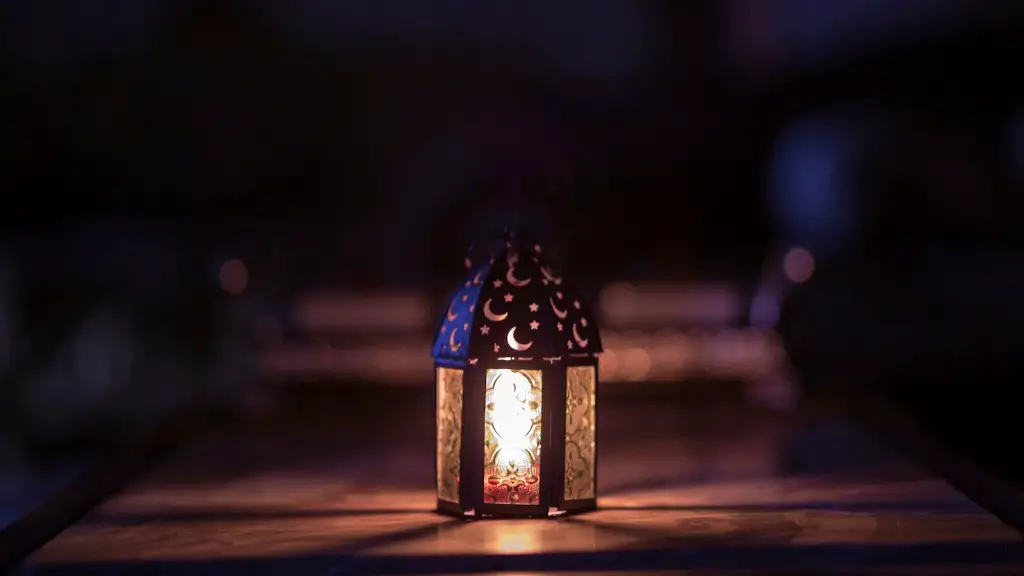Menstruation is a natural process through which women of childbearing age expel the lining of the uterus, along with blood and other material, from their bodies every month. In some cultures, however, it is treated with deep suspicion or even revulsion, and Hinduism is one of them.
Hinduism is a deeply complex religion with a strong emphasis on purity. This has led to anti-menstruation sentiment within its adherents. Hinduism does not explicitly ban menstruating women from participating in rituals, but there are certain activities—such as entering temples, touching holy objects, and engaging in spiritual practices—that are discouraged or forbidden when a woman is menstruating.
The origin of this belief is unclear. Some experts have speculated that the view of menstruation as impure is related to the fear of blood and, more specifically, the fear of the power of femaleness. Others suggest it was a means of control, as women were restricted from participating in religious and social activities, which were fully available to men.
Whatever its source, this cultural norm has serious implications for women, as it reinforces gender inequality. Menstruating women are often stigmatized, and their suffering is minimized while they are treated with suspicion or even ridiculed.
In recent years, however, there has been a move towards changing this traditional mindset. Many Hindu groups and individuals have begun re-evaluating the notion and have come to see periods in a more positive light. A number of grassroots initiatives have been launched in an effort to normalize the experience of menstruation and to de-stigmatize it for both religious and social purposes.
Furthermore, Hindu thought leaders have been vocal about the need for education and awareness about the natural process of menstruation. This includes education about menstrual hygiene, reproductive health, and women’s rights, which are all important topics that need to be addressed in order to reduce the stigma around periods.
Overall, while the idea of menstruation being impure is deeply entrenched in Hinduism, there is a growing movement towards change. This is not only beneficial for women, but also for the faith as a whole, as it sends a strong message that menstrual cycles are natural and nothing to be embarrassed of or fear.
Health Risks Associated with Menstruation
Menstruation can be a difficult experience both physically and emotionally. Not only can it be painful and uncomfortable, but it can also be associated with a number of health risks. These can include anemia, premenstrual syndrome (PMS), endometriosis, and pelvic inflammatory disease (PID). Therefore, it is important for women to take care of themselves during their periods and seek medical attention if they experience any unusual symptoms or prolonged discomfort.
One way of reducing the risk of such complications is by engaging in a healthy lifestyle. This includes getting regular exercise, eating a balanced diet, and getting enough sleep. Furthermore, women should make sure to use the correct sanitary products for their menstrual cycle and change them regularly as recommended.
In addition to this, women should also seek medical advice if they find that their periods are particularly heavy, painful, or irregular. While these symptoms are common, they may indicate the presence of a more serious condition and should not be ignored. By taking care of their health and well-being, women can reduce the risks associated with menstruation and lead healthier lives.
The Role of Men in Menstruation
The perception of menstruation being impure is not only harmful for women, but for men as well. The lack of understanding and knowledge about periods can lead to men perpetuating the stigma and treating women differently. This can be seen in the various ways in which men are excluded from the conversation, whether it be through jokes, taboos, or avoidance of the topic entirely.
In addition to this, men can also play an important role in changing the traditional view of menstruation. By taking an active role in conversations, engaging in education and information-sharing, and providing support to those who menstruate, men can help to reduce the stigma and increase understanding and acceptance of the natural cycle.
Furthermore, parents can also play a significant role in helping to end the silence surrounding menstruation by talking to their children about it from an early age. This can help to normalize the experience for girls and boys alike, as well as ensure that children have access to accurate information about the menstrual cycle and its associated health risks.
Overall, it is important for both men and women to recognize that menstruation is a natural and normal part of life. By educating ourselves and having open and honest conversations about it, we can help to reduce the stigma and create a more inclusive and accepting environment for those who menstruate.
Attitudes Around the World
Menstrual stigma is not unique to Hinduism. It is a problem that is seen across cultures and religions, with similar stories of oppression and marginalization. While progress is being made in some areas, in others the stigma remains entrenched in the beliefs and customs of many communities.
One of the countries where the issue has been particularly prevalent is India, where there are many taboos and superstitions associated with periods. Women can be barred from temples, kitchens, and other spaces when they are menstruating, and there have even been reports of teenage girls being ostracized from their communities due to their periods.
However, there have also been some positive steps in recent years. There are now a number of campaigns designed to challenge and change the attitudes towards menstruation, such as the global initiative ‘Menstrual Hygiene Day’. This initiative aims to raise awareness, reduce stigma, and promote access to menstrual hygiene products and services.
In addition to this, there has been a move towards using more inclusive language when discussing menstruation, as well as the creation of menstrual products that are not aimed solely at women, such as menstrual cups, reusable pads, and period-proof underwear. These small changes have the potential to make a big difference in challenging traditional attitudes about periods.
Overcoming the Shame and Ignorance
Though cultural and religious traditions have long perpetuated the idea of menstruation being impure, in recent years there has been a move towards challenging and changing this notion. By normalizing the experience of menstruation and engaging in conversations and education, we can help to reduce the stigma around periods that is so deeply rooted in many societies.
Furthermore, it is not only women who can make a difference, but men as well. By joining in conversations, engaging in education and information-sharing, and providing support to those who menstruate, we can create a more inclusive and accepting environment for those who menstruate.
Ultimately, the idea that menstruation is impure is a redundant and outdated notion that has no place in the 21st century. It is time to move forward and recognize that periods are a natural part of life, and that instead of feeling ashamed, we should be embracing and celebrating them.

